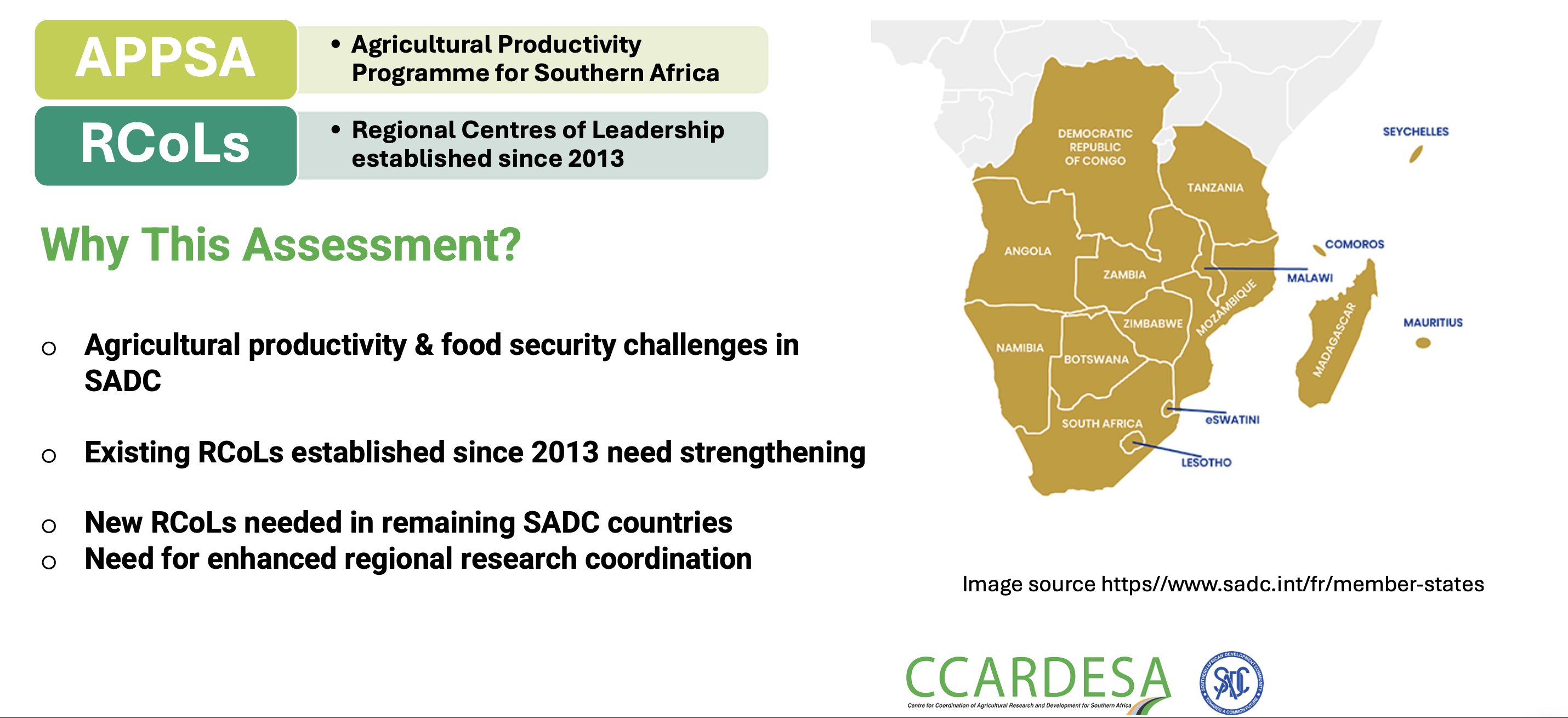The Southern African Development Community (SADC) region faces persistent agricultural productivity and food security challenges, exacerbated by climate change-induced droughts, erratic water supplies, infrastructure deficits, and low investment in agricultural research. To address these pressing issues, the Centre for Coordination of Agricultural Research and Development for Southern Africa (CCARDESA) has been at the forefront of establishing and strengthening Regional Centers of Leadership (RCoLs) to drive agricultural innovation and knowledge-sharing across the SADC region.
RCoLs serve as specialized hubs for agricultural research, technology development, and capacity building, focusing on key commodities and farming systems essential for regional food security. Under the World Bank-funded Agricultural Productivity Programme for Southern Africa (APPSA), each participating country hosts an RCoL dedicated to a priority commodity:
- Zambia – RCoL in Food legumes and legume-based farming systems.
- Malawi – RCoL in Maize and maize-based farming systems.
- Mozambique – RCoL in Rice and rice-based farming systems.
- Angola (Phase 2) – RCoL in Cassava and cassava-based farming systems.
- Lesotho (Phase 2) – RCoL in Horticulture and horticulture-based farming systems.
The overarching goal of APPSA is to boost agricultural productivity and resilience by strengthening research capacities, upgrading infrastructure, and fostering regional collaboration. Research outcomes from each RCoL are expected to benefit the entire SADC region through knowledge sharing, reducing duplication and enhancing resource efficiency across Member States.
Assessing the Impact: RCoLs Needs Assessment Study

Recognizing the need for continuous improvement and promoting resilience in the region’s food systems, CCARDESA recently commissioned a comprehensive RCoL Needs Assessment under the World Bank funded Food Systems Resilience Programme (FSRP). The study aimed to identify key gaps in:
- Human resources – Availability of skilled personnel and training needs;
- Infrastructure – Research facilities, laboratories, and technology access;
- Finance – Sustainable funding mechanisms and investment gaps; and
- Climate-related challenges – Adaptation strategies and resilience measures.
The study also examined high-level policy gaps, institutional frameworks, and budgeting decisions that influence food systems resilience. Additionally, for countries yet to establish RCoLs, the study aimed to identify priority research and development commodities based on national preferences and regional competitiveness. It also explored CCARDESA’s role in strengthening the effectiveness of RCoLs in addressing food security and resilience challenges.
Webinar: A Step Towards Strengthened Agricultural Research
On February 11, 2025, CCARDESA hosted a high-level webinar to validate the findings of the RCoLs Needs Assessment Study. The event brought together representatives from SADC Member States, development partners, the private sector, and key stakeholders to discuss actionable strategies based on the study’s recommendations.

In his opening remarks, CCARDESA Executive Director, Prof. Cliff Sibusiso Dlamini, emphasized the crucial role of RCoLs as engines of innovation and resilience in agricultural research. He highlighted the need for enhanced regional collaboration, investment in infrastructure, and sustainable funding models to ensure the long-term success of RCoLs.
Key Findings and Take aways
The study identified several critical factors for strengthening RCoLs:
- Regional collaboration – Cross-border technology sharing, joint research programs, and harmonized protocols to enhance research efficiency.
- Capacity building – Continuous investment in human capital development and mentorship programs are essential.
- Infrastructure and resources – Modern research facilities, sustainable funding mechanisms, and alternative energy sources are key enablers of resilience.
- Technology dissemination – Strengthening research-extension linkages and engaging the private sector to facilitate widespread adoption of innovations.
- Policy and institutional frameworks – Clear policies, regional harmonization, and robust monitoring and evaluation systems contribute to long-term success.
Strategic Actions Moving Forward
Based on the study’s findings, going forward, CCARDESA and its partners will focus on the following strategic actions:
- Strengthening regional collaboration through shared research programs and resource pooling; • Enhancing institutional frameworks to support research and innovation;
- Developing sustainable funding models for long-term RCoL viability;
- Modernizing research infrastructure and expanding access to advanced technology; and
- Investing in research capacity building, training, and knowledge-sharing platforms.
The Validation Meeting marks a significant milestone in the journey toward strengthening RCoLs as pillars of agricultural research and innovation in the SADC region. By addressing capacity gaps and fostering collaboration, CCARDESA aims to enhance agricultural productivity, resilience, and food security—ultimately contributing to economic growth and sustainable development across Member States.
Kindly click on the following links to download the full or abridged report in your preferred language:
- Abridged ENGLISH: https://www.knowledgehub.ccardesa.org/assessment-establishment-new-strengthening-current-regional-centres-leadership-sadc-member-states
- Abridged FRENCH: https://www.knowledgehub.ccardesa.org/evaluation-de-la-mise-en-place-et-du-renforcement-des-centres-regionaux-actuels-de-leadership-dans
- Abridged PORTUGUESE: https://www.knowledgehub.ccardesa.org/avaliacao-para-o-estabelecimento-de-novos-centros-regionais-de-lideranca-e-o-fortalecimento-dos
- Full report ENGLISH: https://www.knowledgehub.ccardesa.org/assessment-establishment-new-strengthening-current-regional-centres-leadership-sadc-member-states-0
- Full report PORTUGUESE: https://www.knowledgehub.ccardesa.org/avaliacao-para-o-estabelecimento-de-novos-centros-regionais-de-lideranca-e-o-fortalecimento-dos-0





